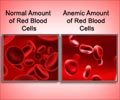Yet another blockbuster drug could be in for some trouble times, if not exactly on the chopping block itself.
A panel of experts advising the US Food and Drug Administration has said that the popular anemia drug could indeed be overused. In some cases it could be proving fatal.While the panel did not recommend specific changes to the official instruction for the drug's use, it did ask the FDA to gather much more data on erythropoietin's safety.
Setting a much higher bar for giving it, prescribing it for shorter periods, and avoiding it altogether in patients with some cancers are all options the agency should consider, it said.
Erythropoietin was first approved for use in 1988 in patients with kidney failure. It is a hormone the kidney normally releases to stimulate red blood cell production in the bone marrow. (Known by its nickname "epo," it has been used illegally by some athletes to boost endurance).
In 1993, erythropoietin use was expanded to include cancer patients who become temporarily anemic from chemotherapy. That use is increasing, with sales up about 40 percent since 2002.
Of the 1.4 million Americans diagnosed with non-blood cancers each year, about 75 percent get chemotherapy. About two-thirds of them become anemic, and about two-thirds of that group are prescribed the drug. Studies have shown that it raises hemoglobin levels and reduces the likelihood of needing a blood transfusion.
Advertisement
A high FDA official said his office will look into how another section of the agency approved advertisements suggesting that Procrit, a branded erythropoietin, makes elderly cancer patients more energetic and able to keep up with their grandchildren.
Advertisement
"There is a fine line between rights of the First Amendment speech and the protection of the American public against false and deceptive advertising," said Richard Pazdur, director of FDA's Office of Oncology Drug Products. "The American public is owed an explanation of why these advertisements were allowed to go on."
Reports of several clinical experiments in which high-dose erythropoietin appeared to shorten the lives of some patients were presented on at a FDA session on Thursday.
Taken together, the FDA developments are considered a serious blow to one of the first, and by far the most lucrative, of today's biotech-made "targeted" drugs.
In 2006, it was the fifth-best-selling class of prescription drugs in the United States. Last year, $10 billion worth was sold, an amount about half the value of the leading class, cholesterol-lowering drugs, whose sales were $21.6 billion, according to the market research firm IMS Health.
What troubled the 17-member FDA advisory committee most was data from five studies - of breast, lung, lymphoid, and throat cancers - suggesting that erythropoietin caused "tumor promotion" and shorter survival in patients randomly assigned to get it rather than a placebo.
Officials of Amgen, the biotechnology company that makes all erythropoietin sold in this country, countered that in those studies the drug was given earlier and more liberally than is current practice. When physicians and patients use the medicine more sparingly, there is no difference in survival, they argued, citing other studies.
Related worries had led the FDA in March to add a special warning to the drug's label, advising doctors to use it less aggressively in kidney-failure patients, in whom it can cause heart problems and blood clots.
Several studies are underway that may shed light on the drug's benefits and hazards. Several panel members, however, called for new studies to answer the questions directly.
Source-Medindia
GPL/B











